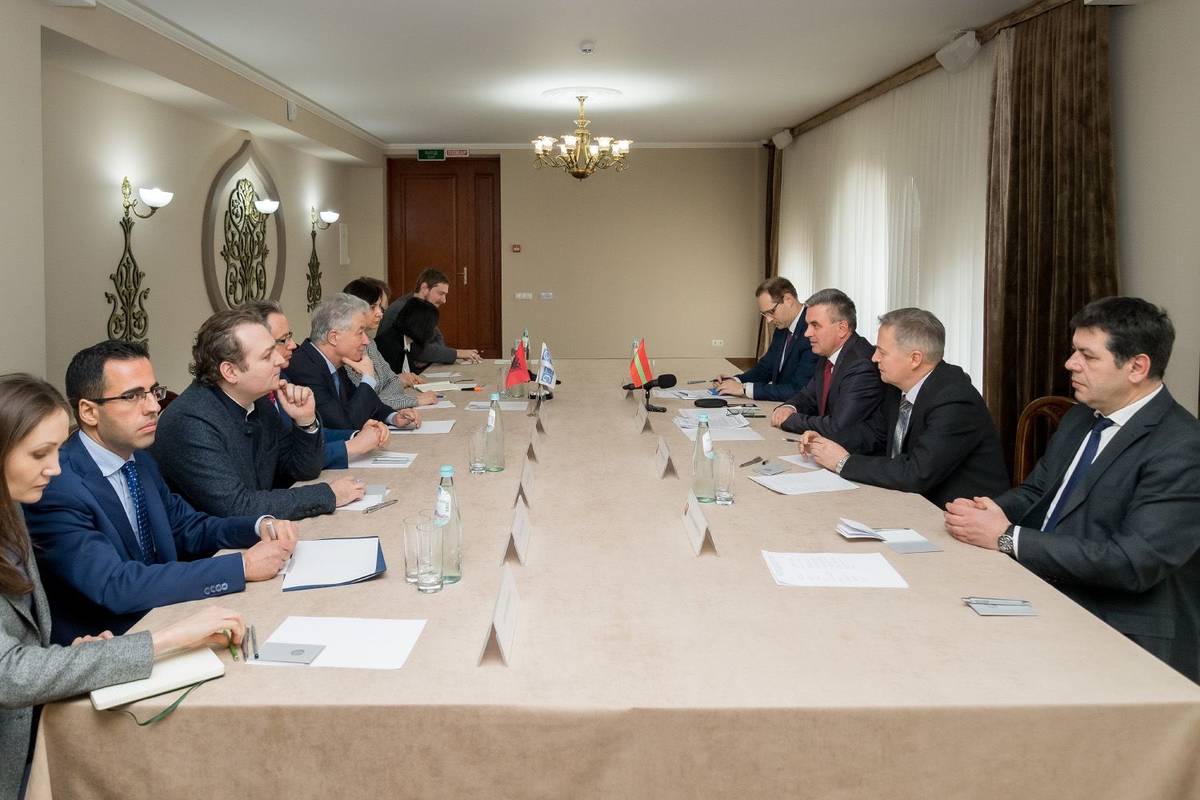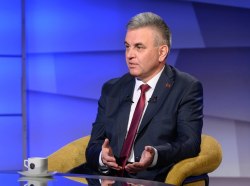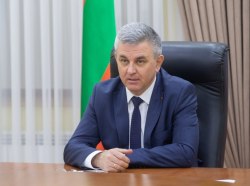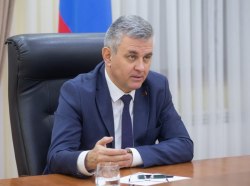This year, the OSCE is chaired by Albania, led by its Prime Minister Edi Rama. The Austrian diplomat Thomas Mayr-Harting has been appointed Special Representative for the Moldova-Pridnestrovie settlement. He is visiting Pridnestrovie for the first time today in this capacity. The diplomat visited the republic: in 2017, as a representative of the European Union in the “5 + 2” format, he met with the President and the PMR Minister of Foreign Affairs. This visit also involves communication with the PMR President, which was preceded by a dialogue with the PMR Foreign Minister.
The meeting of the PMR President Vadim Krasnoselsky and the Special Representative of the OSCE Chairman-in-Office was held in Bendery in the conference hall located on the territory of the Alexander Nevsky Park. The host side, in addition to the PMR President, is represented by the Minister of Foreign Affairs Vitaly Ignatiev and the Advisor to the PMR President on foreign policy, Ambassador on special assignments with the rank of Deputy Minister Ruslan Slobodenyuk. The delegation, led by Thomas Mayr-Harting, includes the Head of the OSCE Mission to Moldova Claus Neukirch and a group of advisers. The meeting’s agenda includes discussion of the current state of affairs in the negotiation process, identification of priority areas of work for the current year and, possibly, a further perspective.

Vadim Krasnoselsky started the dialogue, calling the dialogue necessary. Welcoming the guests, the PMR President noted that Pridnestrovie highly appreciates the importance of the Organization for Security and Cooperation in Europe and expects the active participation and productivity of the Albanian chairmanship in the negotiation process between Pridnestrovie and Moldova. Vadim Krasnoselsky called significant the fact that Mr. Harting is well acquainted with the situation, the negotiation agenda and the principles of the “5 + 2” format.
The PMR President spoke about noticeable decrease in negotiation activity close to stagnation last year after two years (2017-2018) of its activation. He voiced specific figures, clearly illustrating the serious reduction in the number of meetings of negotiators and meetings of expert (working) groups, the activities of which Vadim Krasnoselsky assigns an important role. The PMR President focused on the non-fulfillment by the Moldovan side of a significant number of obligations undertaken as a result of previous agreements. Concrete examples were given, items on the negotiation agenda that did not lose relevance from meeting to meeting were named. The PMR President noted that the course of the negotiation process has always been difficult, but in 2019, electorally active for Moldova, there was a clear transition from a compromise movement based on reasonable pragmatism towards each other to stagnation of negotiations with clear signs of Moldova’s desire to stagnate or even to stop completely the format of the “Permanent Conference...”. Vadim Krasnoselsky recalled the situation with the non-signing of the final documents in Bavaria and Bratislava, outlining his vision of the reasons for what happened.
The PMR President emphasized that the Pridnestrovian side is responding to any facts of violation of the rights of Pridnestrovians. He called on the OSCE representatives not to leave unnoticed these aspects and the course of the negotiation process as a whole, noting that the Pridnestrovian side is interested in the position of European diplomats and their participation in resolving problematic issues is valuable.
Thomas Mayr-Harting, in turn, noted that the significance of resolving the issues of the Pridnestrovian-Moldovan negotiation agenda for him is evidenced by the fact that he arrived in Pridnestrovie three weeks after his appointment to the post of Special Representative. The diplomat noted that he will take measures to intensify work in the previous directions, and expects to offer new opportunities to solve existing problems. Thomas Mayr-Harting said that he arrived in Pridnestrovie via the Gura-Bykului – Bychok. He noted the importance of this initiative, emphasizing that it is necessary to make every effort so that its practical implementation is one hundred percent.
After exchanging greetings and indicating by the parties a position on the main issues on the agenda, the interlocutors continued working dialogue without participation of mass media.








